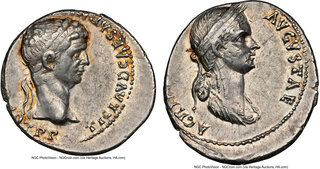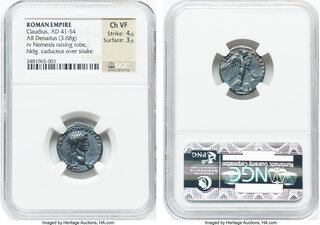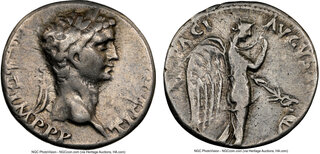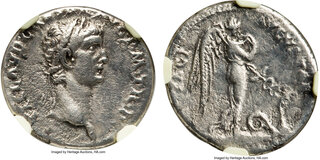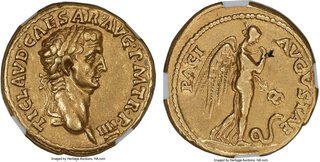Match 1:
Match 2:
Match 3:
| Heritage World Coin Auctions > Showcase Auction 61375 | Auction date: 20 May 2024 |
| Lot number: 25192 Price realized: This lot is for sale in an upcoming auction - Bid on this lot  | |
| Lot description: Ancients Claudius I (AD 41-54). AR cistophorus (26mm, 11.01 gm, 7h). NGC Choice XF 5/5 -3/5, Fine Style. Ephesus, ca. AD 41-42. TI CLAVD-CAES AVG, bare head of Claudius I left; dotted border / COM-ASI, distyle temple containing figure of Claudius (on left) standing facing, spear in right hand, being crowned with right hand by female figure (on right), cornucopia in left hand; ROM ET AVG on entablature, dotted border. RIC I 120. RPC I 2221. Marvelous attention to detail. Son of the great general Drusus, and Antonia, niece of the emperor Augustus, Tiberius Claudius Drusus seemed well-positioned when he was born in 10 BC. But a serious childhood illness left him with a limp, a stammer, and other qualities that made him the black sheep of the family. While these problems barred him from a political career, such exclusion also granted him immunity from the family's murderous intrigues. Upon Caligula's assassination in January, AD 41, Claudius was the sole surviving Julio-Claudian male and, when members of the Praetorian Guard found him cowering behind a curtain in the palace, they immediately acclaimed him as Emperor. Claudius astutely awarded the Praetorians a substantial bonus, and with 10,000 heavily armed soldiers backing him, he easily forced the Senate to accept him as the next princeps. Once installed, Claudius surprised everyone by ruling with intelligence and moderation. In AD 43, he ordered the invasion and annexation of Britain, the first major addition of territory to the Empire since the days of Augustus. He exercised discernment in his selection of provincial governors and exhibited adept diplomacy in handling foreign relations. However, his notable shortcomings lay in his excessive attention to minutiae, dependence on freedmen and close associates, and his questionable choices in romantic partners. His third wife, Messalina, known for her promiscuity, wielded significant influence as Empress and became embroiled in a scandalous conspiracy in AD 48, which posed a threat to his rule. Subsequently, his next wife, Agrippina the Younger, skillfully utilized her influence to consolidate her own power and advance the position of her son, Nero, from a previous marriage, within the succession plans. This done, she fed Claudius a dish of poisoned mushrooms in October AD 54, and brought his 13-year reign to an end. Despite many missteps and his unsavory demise, Claudius had been a fairly successful ruler and his regime set a pattern for the Flavians and the reigns that followed. https://coins.ha.com/itm/ancients/roman-imperial/ancients-claudius-i-ad-41-54-ar-cistophorus-26mm-1101-gm-7h-ngc-choice-xf-5-5-3-5-fine-style/a/61375-25192.s?type=DA-DMC-CoinArchives-WorldCoins-61375-05202024 HID02906262019 © 2024 Heritage Auctions | All Rights Reserved | 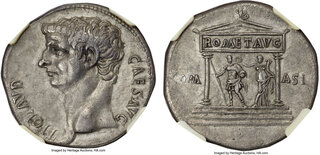 |
Match 4:
Match 5:



